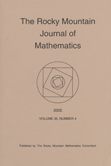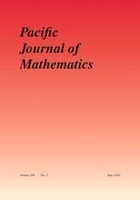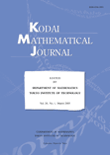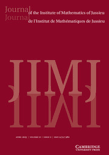
Pure and Applied Mathematics Quarterly
Scope & Guideline
Pioneering Insights in Pure and Applied Mathematics
Introduction
Aims and Scopes
- Geometric Analysis and Differential Geometry:
This area includes research on the geometry of manifolds, curvature properties, and the stability of geometric structures, often employing techniques from differential equations and topology. - Mathematical Physics:
Papers in this domain explore the mathematical foundations of physical theories, including general relativity, quantum mechanics, and the analysis of spacetimes, often utilizing advanced calculus and algebraic techniques. - Algebraic Geometry and Number Theory:
This scope covers the study of geometric structures over algebraic varieties, including cohomology theories, modular forms, and arithmetic properties, emphasizing the connections between geometry and number theory. - Functional Analysis and Operator Theory:
Research in this area focuses on the properties and applications of linear operators and functional spaces, addressing topics such as spectral theory and the analysis of differential operators. - Combinatorics and Graph Theory:
This field includes studies on graph properties, combinatorial structures, and their applications in various mathematical contexts, highlighting the role of discrete mathematics in broader mathematical theories. - Topology and Homotopy Theory:
Papers investigate topological spaces, continuous functions, and homotopical properties, contributing to the understanding of shape and space in mathematical contexts. - Mathematical Logic and Foundations:
This area explores the underlying logical structures of mathematics, including set theory, model theory, and proof theory, emphasizing foundational questions and their implications for mathematical practice.
Trending and Emerging
- Interdisciplinary Approaches:
There is a growing trend towards research that bridges pure mathematics with applied fields, particularly in areas like mathematical physics and data science, indicating a shift towards practical applications of theoretical concepts. - Nonlinear Dynamics and Stability Theory:
Recent publications increasingly focus on the stability of solutions to nonlinear equations, particularly in geometric contexts, underscoring the relevance of these studies in both mathematics and applied sciences. - Algebraic and Geometric Topology:
An emerging focus on algebraic invariants and their geometric interpretations is evident, reflecting a resurgence of interest in the connections between topology and algebraic structures. - Quantum Geometry and Mathematical Physics:
Research at the intersection of quantum theory and geometry is on the rise, highlighting the importance of mathematical frameworks in understanding physical phenomena.
Declining or Waning
- Classical Analysis Techniques:
While still relevant, traditional methods of analysis, such as those focusing exclusively on real and complex analysis without modern extensions, are less frequently discussed in recent publications. - Elementary Number Theory:
Papers solely dedicated to elementary aspects of number theory seem to have decreased, with more emphasis now placed on algebraic and geometric approaches to number-theoretic problems. - Discrete Mathematics without Applications:
Research focused purely on combinatorial aspects without practical applications or connections to other fields is becoming less common, indicating a trend towards interdisciplinary work.
Similar Journals

ROCKY MOUNTAIN JOURNAL OF MATHEMATICS
Elevating Mathematical Discourse Since 1971ROCKY MOUNTAIN JOURNAL OF MATHEMATICS, published by the Rocky Mountain Math Consortium, serves as a critical platform for researchers and practitioners in the field of mathematics since its inception in 1971. With a notable presence in the academic community, this journal covers a broad spectrum of mathematical disciplines, positioning itself in the Q2 category for Mathematics (miscellaneous) as of 2023. Despite being a subscription-based journal, it is recognized for its rigorous peer-review process and contributions to theoretical and applied mathematics, helping to advance knowledge and foster collaboration among mathematicians. The journal's ISSN number is 0035-7596 and its E-ISSN is 1945-3795, reflecting its commitment to accessibility and dissemination of high-quality research. Based in Tempe, Arizona, at Arizona State University, the journal continues to play an important role in shaping contemporary mathematical discourse through well-researched articles and innovative studies, aiming to bridge gaps between various mathematical subfields and engage a diverse audience, including students and established researchers alike.

HOUSTON JOURNAL OF MATHEMATICS
Fostering Innovation in Miscellaneous MathematicsHOUSTON JOURNAL OF MATHEMATICS, published by the University of Houston, serves as a valuable platform for disseminating significant findings in the field of mathematics, specifically within the realm of miscellaneous mathematics. Despite its current categorization in Q4 for 2023, the journal plays a crucial role in fostering academic discussion and exploration among researchers, professionals, and students alike. With its ISSN 0362-1588, the journal has been publishing original research since 1996, with a recent gap filled from 2022 to 2023, thereby continuing to contribute to the mathematical community. While it does not currently offer open access options, the journal's commitment to quality research maintains its relevance within the field and invites submissions that can elevate its standing. Located in the vibrant city of Houston, Texas, the journal not only emphasizes theoretical advancements but also encourages applied mathematical research that intersects with other disciplines, enhancing its significance and reach.

PACIFIC JOURNAL OF MATHEMATICS
Connecting Scholars through Impactful Mathematical ResearchThe PACIFIC JOURNAL OF MATHEMATICS, established in 1951 and published by Mathematical Sciences Publishers, is a premier peer-reviewed journal in the field of mathematics, renowned for its rigorous scholarship and impactful research contributions. With an HIndex that reflects its sustained academic influence, this journal has been categorized within the Q1 quartile in the field of mathematics (miscellaneous) as of 2023, showcasing its position among the top-tier mathematics journals globally. Although the journal operates under a traditional subscription model rather than an Open Access format, it remains dedicated to disseminating original research that spans various domains within mathematics. Researchers, professionals, and students alike will find the journal's breadth of topics and commitment to quality work instrumental in advancing their understanding and exploration of mathematical concepts. This esteemed journal continues to thrive as a vital resource for the mathematical community through its comprehensive collection of articles from a diverse range of mathematical disciplines, thus maintaining a significant role in shaping the future of mathematical inquiry.

European Journal of Mathematics
Your Gateway to High-Quality Mathematical ResearchWelcome to the European Journal of Mathematics, a prominent publication that serves as a vital platform for disseminating high-quality research in the field of mathematics. Published by Springer International Publishing AG, this journal has witnessed significant growth since its inception in 2015 and is recognized for its contributions within the Q2 category of Mathematics (miscellaneous) as per the 2023 rankings. With an ISSN of 2199-675X and an E-ISSN of 2199-6768, the journal aims to foster innovation and collaboration among researchers, professionals, and students alike. Although it operates under a traditional access model, the journal's commitment to advancing mathematical knowledge and applications cannot be overstated. Positioned among the top-tier publications, the European Journal of Mathematics is an essential resource that encourages the exploration of emerging trends and theories in mathematics, making it indispensable for anyone striving to stay at the forefront of this dynamic field.

Kodai Mathematical Journal
Bridging Tradition and Novelty in MathematicsKodai Mathematical Journal is a distinguished publication dedicated to advancing the field of mathematics, particularly in miscellaneous areas. Established in 1949, this esteemed journal has been a reputable source for researchers and practitioners who seek to contribute to the rich landscape of mathematical knowledge. Published by KINOKUNIYA CO LTD, the journal is based in the academic environment of Tokyo Institute of Technology and serves a global audience with rigorous and insightful research articles. Despite its current Q3 quartile ranking in the Scopus Mathematics category, which reflects its niche but impactful contributions, the journal is poised for growth; the convergence of traditional and novel mathematical techniques promises to enhance its relevance further. Researchers, professionals, and students are encouraged to engage with the rich content of the journal, aimed at fostering collaboration and nurturing innovation in the mathematical community. While currently not available as Open Access, Kodai Mathematical Journal remains a critical resource for those passionate about mathematics and its applications.

Journal of the Institute of Mathematics of Jussieu
Shaping the Future of Mathematics, One Article at a TimeJournal of the Institute of Mathematics of Jussieu, published by Cambridge University Press, is a leading academic journal that has established itself as a vital resource in the field of mathematics. With an impressive impact factor and a ranking in the top quartile (Q1) of miscellaneous mathematics, the journal serves as a platform for high-quality research from both established scholars and emerging researchers. Spanning from 2002 to 2024, the journal aims to foster collaboration and innovation in the mathematical community by publishing original research articles, reviews, and critical discussions on a wide range of mathematical topics. Although the journal does not offer open access, it remains widely accessible through various academic institutions and libraries, ensuring that critical advancements in mathematics are shared with a global audience. Located in the United Kingdom at the prestigious Cambridge campus, the journal reflects the rigorous standards of its publisher and the rich academic tradition of its home institution.

Matematicki Vesnik
Elevating mathematical insights for researchers and students alike.Matematicki Vesnik is a distinguished open-access journal published by the MATH SOC SERBIA-DRUSTVO MATEMATICARA SRBIJE, dedicated to advancing the field of mathematics since its inception. With an ISSN of 0025-5165 and an E-ISSN of 2406-0682, this journal has been a significant platform for disseminating research findings since its establishment in 1993. Hosted in Serbia, it embraces a broad scope of mathematical discourse while achieving a Q3 category ranking in miscellaneous mathematics for 2023. As part of its commitment to fostering scholarly communication, Matematicki Vesnik is accessible to a global audience, promoting high-quality research and innovative ideas within the mathematical community. With converged years from 1999 to 2024 and a Scopus rank of #232 out of 399 in General Mathematics, the journal plays a crucial role in enhancing visibility and impact for researchers, professionals, and students alike in the dynamic landscape of mathematical inquiry.

TRANSACTIONS OF THE AMERICAN MATHEMATICAL SOCIETY
Advancing Mathematical Frontiers Since 1900TRANSACTIONS OF THE AMERICAN MATHEMATICAL SOCIETY, published by the American Mathematical Society, is a premier journal in the field of mathematics that has been contributing to the advancement of mathematical knowledge since 1900. With an ISSN of 0002-9947 and an E-ISSN of 1088-6850, this journal holds a prestigious position in the academic landscape, evidenced by its Q1 rankings in both Applied Mathematics and Miscellaneous Mathematics categories as of 2023. With a Scopus ranking of #97 in General Mathematics and a percentile standing of 75th, the journal is recognized for its rigorous peer-review process and the quality of the research it publishes. Though it does not currently offer open access options, it essentially serves as a vital resource for researchers, professionals, and students seeking critical insights and developments in mathematical theory and applications. The Transactions aim to publish high-quality research articles that foster the exchange and dissemination of ideas, supporting the growth of both theoretical and applied mathematics within the global scholarly community.

Cambridge Journal of Mathematics
Fostering Collaboration Through Mathematical InquiryCambridge Journal of Mathematics, published by INT PRESS BOSTON, INC, is a premier platform for the dissemination of cutting-edge research in the field of mathematics. With an ISSN of 2168-0930 and E-ISSN 2168-0949, this journal stands out in a competitive academic landscape, currently ranked #58 out of 399 in General Mathematics, placing it in the top 15% within its category according to Scopus metrics. The journal serves as a vital resource for researchers, professionals, and students alike, aiming to foster groundbreaking mathematical inquiries and foster collaboration across disciplines. Published from 2020 to 2024, the Cambridge Journal of Mathematics is committed to maintaining high standards of scholarship, making it an essential read for those who are passionate about advancing mathematical knowledge and its applications.

JOURNAL OF THE EUROPEAN MATHEMATICAL SOCIETY
Pioneering Open Access in MathematicsThe JOURNAL OF THE EUROPEAN MATHEMATICAL SOCIETY, published by the EUROPEAN MATHEMATICAL SOCIETY (EMS), stands as a premier platform in the field of mathematics, known for its rigorous editorial standards and impactful contributions to both applied and theoretical aspects of the discipline. With a commendable Q1 ranking in both Applied Mathematics and Miscellaneous Mathematics categories, alongside a Scopus rank of 32 out of 399 in General Mathematics, this journal has established itself as a crucial resource for researchers and professionals. Since achieving Open Access status in 2021, it has expanded its reach, making cutting-edge research more accessible to a global audience. With a publication horizon extending from 2002 to 2024 and a dedicated focus on high-quality mathematical scholarship, the journal continues to foster innovation and collaboration within the mathematical community.